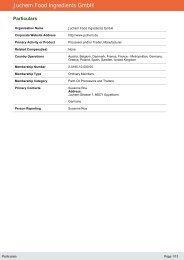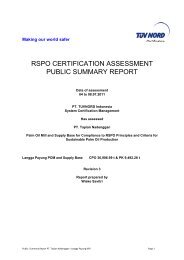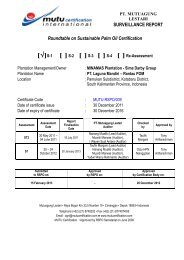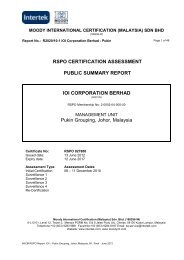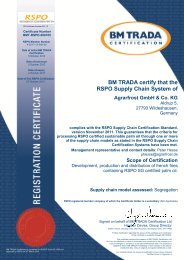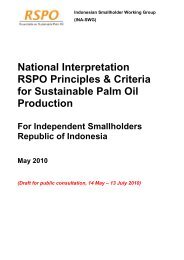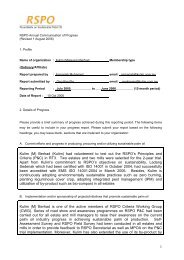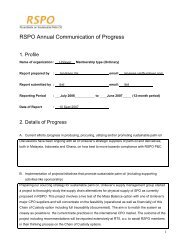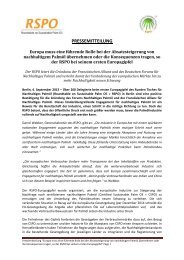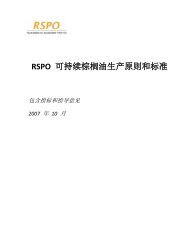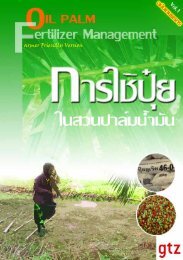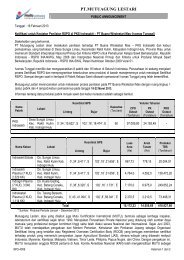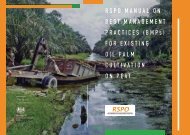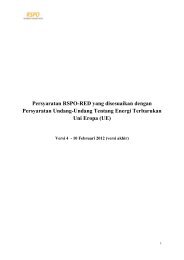NBPOL RSPO Annual Communication of Progress 2005-6
NBPOL RSPO Annual Communication of Progress 2005-6
NBPOL RSPO Annual Communication of Progress 2005-6
You also want an ePaper? Increase the reach of your titles
YUMPU automatically turns print PDFs into web optimized ePapers that Google loves.
<strong>RSPO</strong> <strong>Annual</strong> <strong>Communication</strong> <strong>of</strong> <strong>Progress</strong><br />
Name <strong>of</strong> organization : New Britain Palm Oil Ltd<br />
Membership type:<br />
Ordinary<br />
Report prepared by :<br />
Dr Simon Lord (slord@nbpol.com.pg)<br />
Report submitted by : Dr Simon Lord (slord@nbpol.com.pg)<br />
Reporting Period: April <strong>2005</strong> to April 2006<br />
Date <strong>of</strong> Report September 16 2006<br />
New Britain Palm Oil Ltd (<strong>NBPOL</strong>) operate 18 oil palm estates, 4 oil mills, an oil refinery<br />
and fractionation plant, bulk terminal, oil palm plant breeding and seed production<br />
facilities and an integrated oil palm and cattle enterprise on the North coast <strong>of</strong> West New<br />
Britain Province. <strong>NBPOL</strong> has 33,209 hectares under cultivation and in addition purchase<br />
and process fruit from a further 22,592 hectares <strong>of</strong> oil palms grown by smallholders.<br />
<strong>NBPOL</strong> has joint venture seed production facilities in Colombia, Indonesia and Malaysia.<br />
Total revenue generated by the company reduced by 9% to K355 million kina in <strong>2005</strong>.<br />
At the operating level <strong>NBPOL</strong> posted a pre tax pr<strong>of</strong>it <strong>of</strong> 90 million kina in 2004, a 28%<br />
reduction over the preceding year due mainly to reduced CPO prices and increased<br />
Fuel related costs. Oil production in <strong>2005</strong> (CPO & PKO) reached a record 234,279 MT<br />
<strong>NBPOL</strong> has maintained certification <strong>of</strong> its entire operation to AS/NZS 1SO 14001 and<br />
upgraded the system to compliance with the newer standard (ISO 14001:2004). The<br />
company continues to utilise the structure and discipline <strong>of</strong> the ISO 14001 standard as a<br />
means to achieve integration <strong>of</strong> Occupational health and Safety (OHS), crop<br />
management and environmental protection and as the vehicle for implementation <strong>of</strong> the<br />
<strong>RSPO</strong> principles and criteria.<br />
<strong>NBPOL</strong> continues to believe that its current practices for the production <strong>of</strong> palm oil are<br />
sustainable and accepts that to maintain these each individual operation must be<br />
regularly scrutinized. <strong>NBPOL</strong> has developed the role <strong>of</strong> the company environmental<br />
advisor, training the job holder to IRCA, International Register <strong>of</strong> Certificated Auditors<br />
standards and in addition has recruited a further pr<strong>of</strong>essional to drive the planned<br />
changes in OHS. Third party surveillance audits by SGS (the accredited body who<br />
certified <strong>NBPOL</strong> to ISO 14001) continue and to date there have been 3 surveillance<br />
audits (9 month intervals) and no major corrective actions have been incurred. There<br />
have been over 200 integrated internal audits since <strong>NBPOL</strong> started ISO 14001 in 2004<br />
and over 400 recorded field and mill visits by senior managers. In addition <strong>NBPOL</strong> has<br />
hosted two compliance audits conducted by the Department <strong>of</strong> Environment &<br />
Conservation aimed at benchmarking the company’s performance against the National<br />
Environment act (2000).<br />
<strong>NBPOL</strong> has developed a tool for self assessment against the <strong>RSPO</strong> principles and<br />
criteria and has published this through the secretariat <strong>of</strong> the Roundtable. As a result <strong>of</strong><br />
the self assessment the company then paid for an independent third party to auditor the<br />
company against the criteria. Both the results and the audit checklist have been made<br />
available to the executive board <strong>of</strong> the roundtable. The company has also promoted the
use <strong>of</strong> sustainable palm oil by providing resources for its <strong>of</strong>ficers to publish and present<br />
three scientific papers on some <strong>of</strong> the issues involved in sustainable oil palm (cf. the<br />
company website www.nbpol.com) and to set up an exhibition booth at the RT3.<br />
<strong>NBPOL</strong> the largest plantation company in PNG has through it’s membership <strong>of</strong> the Palm<br />
Oil Producers <strong>of</strong> Papua New Guinea sponsored <strong>of</strong>ficers to attend the Criteria Working<br />
Group and Executive Board <strong>of</strong> the <strong>RSPO</strong>. In addition <strong>NBPOL</strong> has sent delegates to the<br />
Smallholders Task force and the verification and Certification Working Group to assist in<br />
this work. Through it’s smallholder extension services it has engaged in the two year<br />
pilot study scheme by examining practical ways <strong>of</strong> introducing the concepts <strong>of</strong> the<br />
sustainable palm oil into extension management. In addition <strong>NBPOL</strong> has through the Oil<br />
Palm Research Association jointly funded both long and short term research aimed at<br />
determining key factors in sustainable management <strong>of</strong> Oil Palm.<br />
Along with other producers in PNG, New Britain Palm Oil is supporting the national<br />
Interpretation working group and it aim to deliver practical guidelines for the<br />
implementation <strong>of</strong> sustainable palm oil within the country. <strong>NBPOL</strong> not only sends<br />
delegates but support the work <strong>of</strong> the secretariat and help to maintain the PNG page <strong>of</strong><br />
the <strong>RSPO</strong> website (www.rspo.org/National%20Interpretation.htm#PNG)<br />
<strong>NBPOL</strong> is actively searching for alternative to the chemicals on the WHO Ia and Ib lists<br />
but recognised that the issue <strong>of</strong> paraquat is <strong>of</strong> prime importance. <strong>RSPO</strong> can help all the<br />
producers <strong>of</strong> PNG by engaging with the manufactures <strong>of</strong> agrochemicals to find a cost<br />
effective means <strong>of</strong> controlling weeds in the immature phase <strong>of</strong> the palm. <strong>NBPOL</strong> is<br />
willing to work with all Stakeholders in the pursuit <strong>of</strong> alternatives and would welcome<br />
joint initiatives.<br />
The company continues to monitor environmental, social as well as financial<br />
performance at the board level and has appointed senior company executives to<br />
oversea both OHS and Environmental issues. Consultants have been engaged to assist<br />
in the integration <strong>of</strong> current health and Safety thinking with the relevant principles in the<br />
<strong>RSPO</strong> and in house training programs are well underway.<br />
<strong>NBPOL</strong> is currently working with The Nature Conservancy on a report on the status <strong>of</strong><br />
the reefs in the Kimbe Bay area and has support a number <strong>of</strong> Provincial Government<br />
environmental initiatives.<br />
The company continues its work on zero effluent discharge. The newest mill (Numundo)<br />
has had zero effluent discharge status since 2000 and the system <strong>of</strong> direct application <strong>of</strong><br />
EFB mixed with mill effluent solids (trialled last year) is now in place in over 1200<br />
hectares and is set to increase substantially next year when the mill expands to 80<br />
tonne / hour. Composting <strong>of</strong> EFB for nursery potting mix has extended to all nurseries<br />
.the entire land area <strong>of</strong> <strong>NBPOL</strong> holdings (33,000 ha) has now characterized and<br />
benchmarks established for a number <strong>of</strong> soil parameters. Work has begun on surveying<br />
vegetation within all riparian strips and buffer zones determining marginal and high<br />
erosion risk areas together with monitoring compaction. Pest and disease outbreaks
along with fertiliser and pesticide applications continue to be monitored centrally through<br />
the OMP agronomic database.<br />
The company assists the local community through the New Britain Palm Oil Foundation,<br />
which is a charitable body set up to make funds available for the betterment <strong>of</strong> health<br />
and education and the improvement <strong>of</strong> social conditions in West New Britain Province.<br />
During <strong>2005</strong> the Foundation donated 5 Double classrooms, as well as the shipping and<br />
construction costs <strong>of</strong> an additional 2 classrooms for the Kimbe and Hoskins Secondary<br />
schools. Funding was also provided for rebuilding <strong>of</strong> the Talasea police station.<br />
The smallholders are a vital part <strong>of</strong> the company’s strategy and supply a third <strong>of</strong> its crop,<br />
Fruit payments for <strong>2005</strong> totalled 54 million kina and the company continues to assist<br />
smallholders by providing credit facilities for the smallholders at its own expense, as well<br />
as voluntarily funding half <strong>of</strong> the Oil Palm Industry Corporation’s smallholder extension<br />
programmes.<br />
TAX CREDIT SCHEME<br />
The company has made successful use <strong>of</strong> the tax credit arrangements whereby an<br />
allowance <strong>of</strong> 0.75% <strong>of</strong> the company’s taxable revenue can be spent on public<br />
infrastructure maintenance and construction. The company has concentrated its tax<br />
credit expenditure so far on the maintenance <strong>of</strong> major highways and village feeder<br />
roads. A total <strong>of</strong> 2.2 million kina was spent on tax credit projects in the year <strong>2005</strong>. In<br />
addition the company has continued, at its own expense, to undertake road<br />
maintenance to allow continued access to villages and settlements



